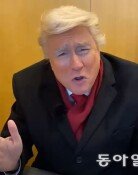‘North Korea is a nuclear state,’ says Trump
‘North Korea is a nuclear state,’ says Trump
Posted January. 22, 2025 07:45,
Updated January. 22, 2025 07:45
U.S. President Donald Trump referred to North Korea as a “nuclear state” and highlighted his close relationship with the North Korean leader. On the first day of his inauguration, President Trump stated, “I was very friendly with Kim Jong Un, and he liked me. I liked him and we got along very well.” He further added, “Now he is a nuclear state. We got along well. I think he will be happy to have me back.” This marked the first time President Trump explicitly referred to North Korea as a “nuclear state.”
Trump’s remark represents a significant deviation from the long-standing U.S. policy of not officially recognizing North Korea as a nuclear state, despite its possession of nuclear weapons. The statement came in response to a question about whether President Joe Biden had designated North Korea as a threat, as former President Barack Obama had done eight years earlier. President Trump also discussed the potential for resuming dialogue with Kim, remarking, “There are many threats right now, but I think the North Korea issue has been resolved well.” In typical fashion, the real estate mogul also mentioned North Korea’s “enormous condominium capacity and many beaches.”
Pete Hegseth, the nominee for Secretary of Defense, had referred to North Korea as a “nuclear state” during his Senate confirmation hearing last week, which stirred controversy over whether it was an acknowledgment of North Korea’s nuclear weapons. In its second term, this prompted speculation that the Trump administration might be pursuing a “small deal” focused on nuclear disarmament or freezing rather than the more complex “big deal” of North Korea’s complete denuclearization. In response, South Korea's Ministry of Foreign Affairs swiftly rejected the notion, reaffirming that the denuclearization of North Korea remains a principle upheld by both South Korea and the international community. However, it appears that President Trump was not swayed by these concerns.
President Trump’s 30-minute inauguration speech served as a declaration of his “America First” agenda. He even expressed his ambition to make the United States a “modern-day empire,” inspiring awe and respect globally. He referenced President William McKinley’s protectionist policies and territorial expansion in the late 19th century. He announced plans to rename the Gulf of Mexico to the Gulf of America and regain control over the Panama Canal. At the same time, he promised to be a peacemaker and unifier.
For President Trump, Kim is someone he believes can be dealt with directly at any time, and he views engaging with Kim as a potential avenue to fulfill his peacemaker ambitions. It remains uncertain how North Korea will respond to this gesture, but it creates a challenging situation for South Korea, which is currently facing a leadership vacuum. The launch of Trump’s second term not only casts doubt on the future of the ROK-US alliance but also raises concerns about the future of extended deterrence against North Korea’s nuclear weapons. South Korea must employ all available diplomatic means to ensure its perspectives are reflected in the evolving U.S. policy toward the Korean Peninsula.



![[광화문에서/김준일]단식 마친 장동혁… 중요한 건 단식 그 다음](https://dimg.donga.com/c/138/175/90/1/wps/NEWS/IMAGE/2026/01/23/133221688.1.jpg)
![라면 먹고도 후회 안 하는 7가지 방법[노화설계]](https://dimg.donga.com/c/138/175/90/1/wps/NEWS/IMAGE/2026/01/23/133219600.3.jpg)

![8년전 한밤 중 목욕탕에 나타난 김정은, 분노한 이유는 [주성하의 ‘北토크’]](https://dimg.donga.com/c/138/175/90/1/wps/NEWS/IMAGE/2026/01/23/133210584.1.jpg)
